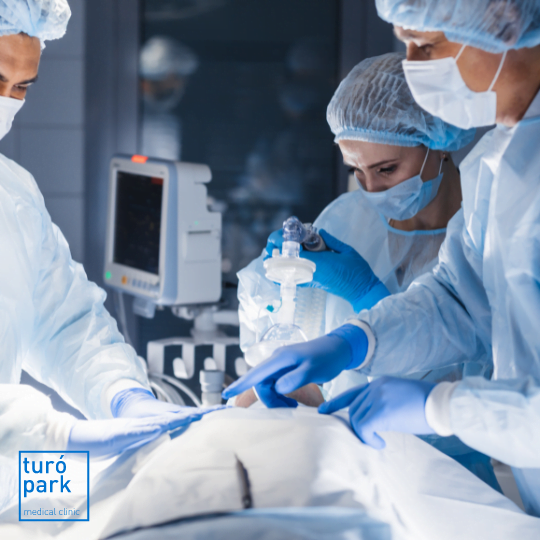Are you suffering from an inguinal hernia and looking for a specialist surgeon in Barcelona?
Inguinal hernias are common, especially in men. It is estimated that one in three men undergoes surgery for this condition in his lifetime. Often symptomatic and without risk of complications, it can nevertheless lead to serious complications and must be managed appropriately.
If you are suffering from an inguinal hernia, make an appointment with one of our multilingual specialists in Barcelona.
What is an inguinal hernia?
An inguinal hernia is a lump that forms under the skin in the groin between the abdomen and the thigh. More specifically, an inguinal hernia occurs when a bowel loop or other abdominal organ passes through an opening in the abdominal wall into the inguinal canal.
Inguinal hernias are more common in men, particularly at the older ages of life. They are very common in infants and older men.
Women, on the other hand, are more often affected by a crural hernia.
Fast track your treatment
To book an appointment or speak with one of our friendly team, please get in touch using the options below.

What are the symptoms of an inguinal hernia?
A small inguinal hernia can be asymptomatic.
If it becomes larger, however, it may cause symptoms such as
- Discomfort or pain in the inguinal area (between the abdomen and the thigh)
- A feeling of heaviness
- The appearance of a "ball" in the groin area.
Inguinal hernia: causes and risk factors
An inguinal hernia can be the result of repeated efforts, carrying loads, being overweight or obese, a chronic cough or constipation.
It occurs more often when there is a deficiency in the abdominal muscles.
What are the possible complications of an inguinal hernia?
The main complication of an inguinal hernia is strangulation, which can lead to severe pain, rapid and severe intestinal obstruction, and finally, necrosis of the trapped tissue.
Strangulation occurs when the hernia is no longer reducible by the usual manoeuvres. This is an emergency and requires surgery.
How is an inguinal hernia diagnosed?
A simple clinical examination is usually sufficient to diagnose an inguinal hernia. By asking the patient to cough, the doctor can feel the impulse of the hernia with his finger. No X-ray or ultrasound is then necessary.
Sometimes the inguinal hernia does not externalise well at the beginning of its evolution and an ultrasound may be useful.
Your health is our priority.
Our English-speaking general surgeons treat a wide variety of conditions & specialized surgical procedures.

How is an inguinal hernia treated?
The treatment of a hernia depends on its size and the symptoms experienced by the patient. If the hernia causes no or minimal symptoms, the surgeon may, in some cases, recommend simple monitoring. A support belt may also be offered to keep the hernia sac in the abdominal area.
If symptoms appear or worsen, surgery is indicated.
The operation consists of reducing and reintegrating the hernia or ventricle and sealing the hernia or ventricle opening with a prosthesis to reinforce and protect the inguinal or abdominal wall.
Two techniques are generally used depending on the size of the hernia and the surgeon's opinion:
- Laparoscopy involves operating through very small incisions in the abdominal wall, using a mini-camera.
- Laparotomy requires a larger incision in the groin.
In both cases, the operation is performed on an outpatient basis and the postoperative course is simple.
How is an inguinal hernia treated at Turó Park Clinics?
If you have an inguinal hernia requiring surgery, our medical team will offer you a complete and personalised treatment:
- Pre-operative assessment: this is used to predict the extent of the operation, but also to determine the possible modes of anaesthesia.
- Operation: with the incision, the operation (laparoscopy or laparotomy), and the sutures.
- Post-operative follow-up: to see if the procedure worked as planned.
Make an appointment now to treat your inguinal hernia in the way that is best for you.
Our multilingual general surgeons


